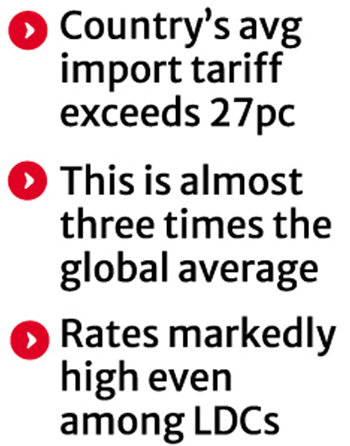Protectionism, apparel export overreliance key barriers
Says ADB chief economist about entry of Bangladesh to multilateral trade blocs

Published :
Updated :

 Protectionist policies and overdependence on apparel exports are among the major internal challenges preventing Bangladesh from joining multilateral trade blocs, said Albert Park, chief economist of the Asian Development Bank (ADB).
Protectionist policies and overdependence on apparel exports are among the major internal challenges preventing Bangladesh from joining multilateral trade blocs, said Albert Park, chief economist of the Asian Development Bank (ADB).
Speaking at an event on the sidelines of the 58th ADB Annual Meeting held recently in the Italian city of Milan, he said it is not that other countries are unwilling to sign trade agreements with Bangladesh.
Rather, the country's internal challenges are the main barriers to forming bilateral and multilateral trade agreements, he also said.
Responding to The Financial Express correspondent's queries, Park said regional and bilateral trade agreements must be emphasised for sustainable business growth in Bangladesh.
The four-day annual meeting, which brought together policymakers and development partners from across Asia and beyond, concluded on May 7.
Asia and the Pacific has significantly benefitted from participating in global value chains by adopting open trade and investment practices, said Park.
However, the region now faces mounting challenges, including Trump's tariff policy, geopolitical tensions, rising protectionism, and growing threats from climate change, pandemics, and other global shocks, he added.
"In this context, strengthening cross-border economic cooperation within Asia and between Asia and the Pacific is essential to building resilience and mitigating external risks," he said during a media group discussion.
Bangladesh's average import tariff exceeds 27 per cent - almost triple the global average. Even among the least developed countries (LDCs), its rates are exceptionally high.
A recent analysis based on the World Bank data showed average tariffs are 11 per cent in low-income, 7.0 per cent in lower-middle-income, 5.0 per cent in upper-middle-income, and 3.0 per cent in high-income economies.
The government has moved to rationalise the high tariff to weather the negative impacts on the economy after it graduates from the LDC status in 2026. The country may lose preferential trade access to many markets then.
Meanwhile, the government has moved to join the Association of Southeast Asian Nations (ASEAN), BRICS, and Regional Comprehensive Economic Partnership (RCEP), among other blocs, to mitigate the adverse impacts.
doulotakter11@gmail.com


 For all latest news, follow The Financial Express Google News channel.
For all latest news, follow The Financial Express Google News channel.